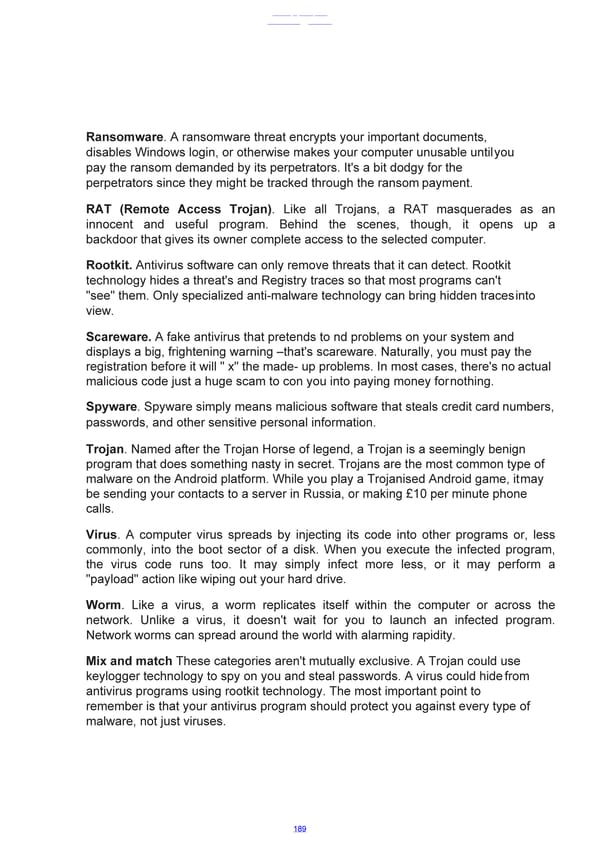Ransomware. A ransomware threat encrypts your important documents, disables Windows login, or otherwise makes your computer unusable unti lyou pay the ransom demanded by its perpetrators. It's a bit dodgy for the perpetrators since they might be tracked through the ransom payment. RAT (Remote Access Trojan). Like all Trojans, a RAT masquerades as an innocent and useful program. Behind the scenes, though, it opens up a backdoor that gives its owner complete access to the selected computer. Rootkit. Antivirus software can only remove threats that it can detect. Rootkit technology hides a threat's and Registry traces so that most programs can't "see" them. Only specialized anti-malware technology can bring hidden trace sinto view. Scareware. A fake antivirus that pretends to nd problems on your system and displays a big, frightening warning –that's scareware. Naturally, you must pay the registration before it will " x" the made- up problems. In most cases, there's no actual malicious code just a huge scam to con you into paying money fo rnothing. Spyware. Spyware simply means malicious software that steals credit card numbers, passwords, and other sensitive personal information. Trojan. Named after the Trojan Horse of legend, a Trojan is a seemingly benign program that does something nasty in secr et. Trojans are the most common type of malware on the Android platform. While you play a Trojanised Android game, i tmay be sending your contacts to a server in Russia, or making £10 per minute phone calls. Virus. A computer virus spreads by injecting its code into other programs or, less commonly, into the boot sector of a disk. When you execute the infected program, the virus code runs too. It may simply infect more less, or it may perform a "payload" action like wiping out your hard drive. Worm. Like a virus, a worm replicates itself within the computer or across the network. Unlike a virus, it doesn't wait for you to launch an infected program. Network worms can spread around the world with alarming rapidity. Mix and match These categories aren't mutually exclusive. A Trojan could use keylogger technology to spy on you and steal passwords. A virus could hide from antivirus programs using rootkit technology. The most important point to remember is that your antivirus program should protect you against every type of malware, not just viruses. 189
 Military English. Learning by Doing. Book Page 30 Page 32
Military English. Learning by Doing. Book Page 30 Page 32